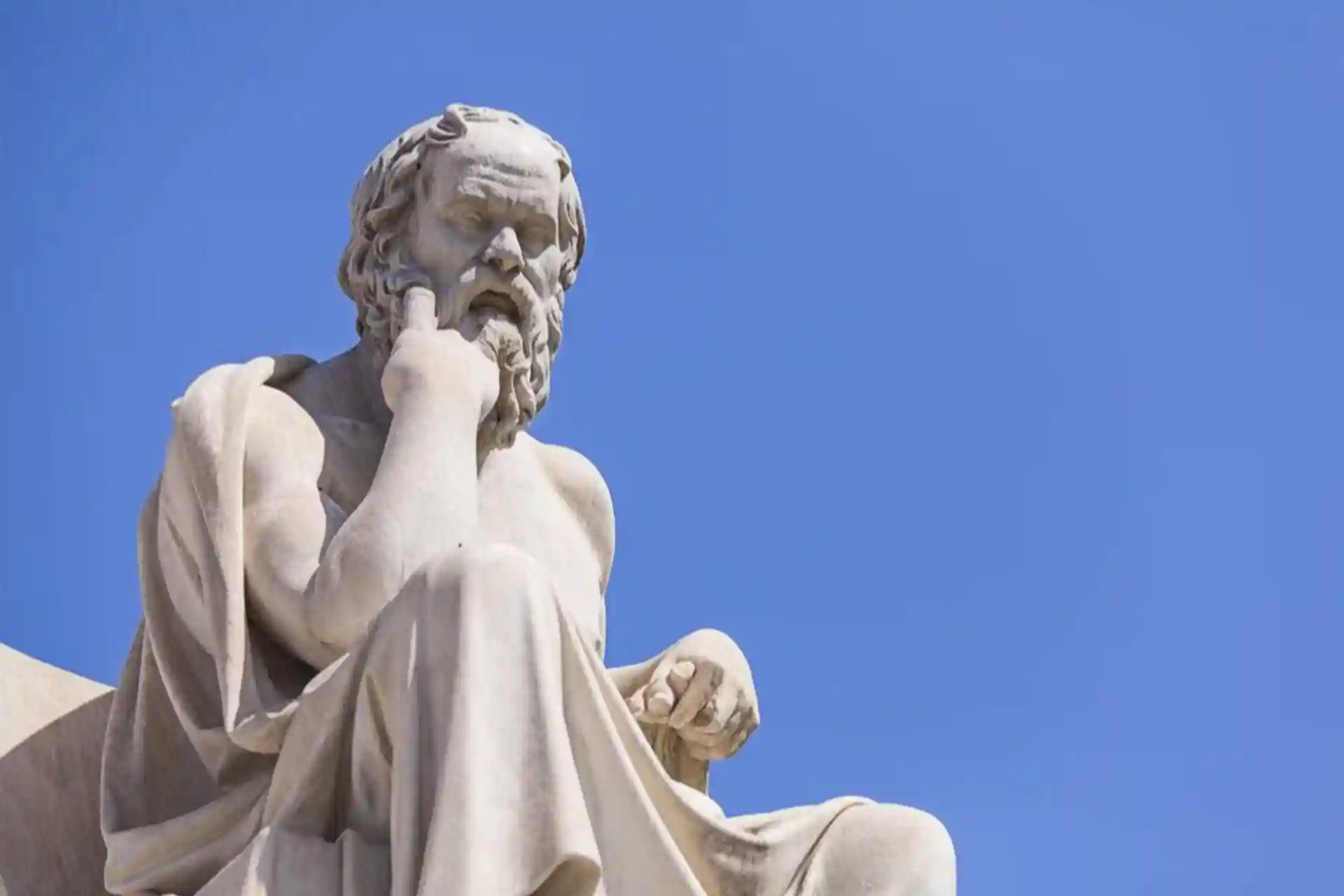Being a good person is not enough: Why do ethics need Islam? (Part 3)
Socrates, considered by many to be the first moral philosopher, said that an unexamined life is not worth living. A good life is a life lived knowing, loving, and seeking moral goodness. Philosophically, universalism (the idea that all people have certain rights) and monotheism (the belief that all people share a single supreme God) are interrelated and compatible. Let's take a look at the saying, "A life without thought is not worth living." It's just a claim: isn't life worth living for ferns, water lilies, or butterflies? Philosophy and its limits - in the article by Ovamir Anjum, head of the Department of Islamic Studies at the University of Toledo (USA), editor-in-chief of the Yaqeen Institute of Islamic Studies and founder of the Ummatics Institute.
Philosophy and its limits
Socrates, considered by many to be the first moral philosopher, said that an unexamined life is not worth living. A good life is a life lived knowing, loving, and seeking moral goodness. Philosophically, universalism (the idea that all people have certain rights) and monotheism (the belief that all people share a single supreme God) are interrelated and compatible. Let's take a look at the saying, "A life without thought is not worth living." It's just a claim: isn't life worth living for ferns, water lilies , or butterflies? What makes this questioning of the nature and purpose of life possible and necessary is our ability to reason, evaluate, and judge. But where does this ability come from? Where does life itself come from? Socrates was not alone; Much of the human philosophy of time and space suggests that people have sought to know and find answers to these questions. But it was impossible for Socrates and his ilk, in spite of their genius, to rise above the idea of a single God, to the worship of a true God, or to some great, balanced, practicable morality. It is worth noting that in Plato's famous work "The Republic" "everything should be governed by one wise philosopher, women and children should not be individuals in their families, but common property, children should be separated from their parents at birth and should be unworthy. It was Socrates who first put forward the idea, which effectively suggests "the most racist and unloving plan of society imaginable, that they should be placed according to their natural and innate capacities so as not to receive the love they deserve". How could a man known as the first and greatest philosopher of ethics come to the conclusion that all viewpoints are the most base and immoral? Because the human mind, even in its most advanced state, is incapable of seeing God as a canvas. Only Allah is free from defects and mistakes. In fact, people are emotionally aware of their own imperfections and have an insatiable thirst for the good and the perfect. We are all looking for God, even if we don't know about him.
A typical book on the history of ethics will teach you that the philosophical discipline of ethics was born in ancient Greece out of a need to wrestle with the very questions we listed above. But this is just a secular, Eurocentric narrative: humanity has never existed without divine guidance, and therefore without morality. God Almighty created the first man with the ability to know good and evil and the obligation to follow the guidance sent through divine messengers. Allah the Exalted said to Adam: "Whoever follows My guidance when guidance comes to you from Me, there is no danger for them, and they will not be sad" (Baqara, 38). Divine guidance was not sent haphazardly or belatedly when people went astray, but a divine plan existed from the beginning of creation. Given this, humans have never lived without divine guidance. People can be divided into two categories: the first are those who, like the ummah of the Prophet, peace and blessings of God be upon him, preserved the divine message given to them without changing it and sought the mercy of God, and the second are those who preserved the guidance sent to them in a partial and distorted form.
The basis of this guidance has always been to recognize the truth of God alone, to worship Him alone, and to do good to one another. Logically speaking, Allah the Exalted could have limited His religion only to worshiping Him, but due to His perfect mercy and wisdom, He made goodness a part of faith in Himself, and through His revealed guidance, He strengthened it in our nature to be kind to others and all creatures. put But people have the nature of forgetfulness, both individually and collectively. Human history is full of periods of human forgetfulness and divine reminders. With the passage of time, the purity of this guidance became lost or corrupted to such an extent that people fell back into polytheism and oppression among themselves.
Therefore, we must reject the Eurocentric fiction that the Greek philosophers of the 6th and 4th centuries BC invented moral reasoning, that the (pagan) Greek philosophers or those who were influenced by them, like the pagans themselves , were also able to understand some parts of the revelation, as was the case with the Arabs. can have. Just as there were monotheistic Hanifs who sought divine guidance in pre-Islamic pagan Arabia, some commentators have classified Socrates, Plato, and Aristotle as monotheists.
Historical evidence shows that the search for truth by these philosophers without actually condemning polytheism (worship of many gods) led them to conceptual monotheism.
The Indian philosophers of the Upanishads were similarly polytheistic, hinting at conceptual monotheism just as the pre-Islamic Arabs justified idolatry and attributed supreme power to God.
This means that either through vestiges of divine guidance or through their own right thinking, people naturally believe in a single ultimate truth, but in most cases, without the blessing of divine revelation, cannot deviate from that point of belief, and on this very subject they go into ceaseless disagreement and confusion. Revelation is necessary for us to attain the attributes of the One True God and the way of life that is acceptable to God.
We repeat that although the human mind discovers divine monotheism and moral truths, it is inevitable that it will make mistakes in this regard. In other words, it is better in every way to know the truth when it is presented than to know it directly. Imam Ibn Taymiyyah refers to Surah Mulk (verse 10) in which the people of disbelief who deny the truth say: "If we had listened (to the prophets) or reasoned, we would not have been among the people of Hell."
But if people don't recognize the Creator and don't praise Him, don't they also forget the rights He created for His creatures?
Our modern empirical experience confirms both of these observations: a natural moral sense (fitrat) exists, and it has certain weaknesses. Even in our highly secularized, artificially mechanized, disconnected from nature, and with no room for reflection, people cannot avoid asking themselves these "big" questions.
A person cannot avoid such existential issues during his life. Our usual choices are to respond to the truth, to ignore it, or to deny it. It is the fundamental moral choice upon which all others depend. It can also be witnessed that when the human mind is controlled by self-serving elites rather than divine revelation, it either devolves into endless discord and cynicism (shamelessness), absurdities such as atheism, or superstitious cults (groups) imitating true religion. In contrast to the choice of "theistic ethics" of all human societies known to us, including most people today, a small hegemonic global elite produces an agnostic or atheistic philosophy and culture that simultaneously rejects the reality of God and at the same time indulges in the most fantastical tales. continues to believe. Like the characters in Alice in Wonderland, they practice believing six impossible things before breakfast.
Without divine law, the line between good and evil cannot be drawn through philosophical arguments. Homosexual behavior was considered the greatest immorality in all cultures until recently, but now the global elite have decided otherwise.
Some have even begun to justify marriage between relatives. Recent eugenics and racist theories of human behavior are mainstream science that justifies the dominance of some races and the criminality of others. Is killing animals (even vegetables) for food really that different from killing people for food? Is killing sick, sick, sick babies really morally equivalent to murder? As the leading moral philosopher of our time, the Christian Alasdair McIntyre, argued in After Morality (1984),
A distinctive feature of the social and cultural order in which we live is that disagreements over central moral issues are inherently stable.
The reason, he says, is that Enlightenment thinkers rejected the monotheistic religious basis of these values and replaced it with a "secular morality" that any sane person could agree with. Originally, religious concepts such as the sanctity of human life, the equality of men before God, and the like have now become orphans, because the conflicting philosophies have not been able to reach a definite agreement on any basis for them. All values in such a secular culture are categorized as good or bad according to emotions, which is a moral theory called emotivism.
In an emotivist culture, moral beliefs are simply based on the manipulation of individuals and each other by the powerful representatives of political elites and capitalists.
In the US Declaration of Independence, Thomas Jefferson partially stated the truth when he wrote the following sentences: "We hold these truths to be self-evident, that all men are created equal and are endowed by their Creator with inalienable rights, including life, liberty, and the pursuit of happiness." These truths have never been self-evident because the norm in human experience is built on difference and inequality in every way; the idea of equality can only come from belief in a spirit given from above. When the revelation is no longer possible, people revert to their previous animal lives.
How does a post-Enlightenment Western society defined by liberal philosophy justify moral principles, which McIntyre calls emotivist? In this regard, the answer of the American constitutional scholar has some truth: it is a kind of intellectual smuggling. Because they do not have an established foundation for themselves, some scholars have accused them of smuggling moral values from mainstream religions.
This truth was expressed more impressively and much earlier by the Russian writer Dostoyevsky, whose hero in Crime and Punishment (1866) states the result of this late 19th-century belief: "If God does not exist, everything is possible."
According to the German philosopher Friedrich Nietzsche, who experienced the consequences of the loss of Christianity in his own life, a madman observing the new Europe foretells what the loss of faith in a God above Europe will lead to:
"How did we drink the seas?" Who gave us the sponge to wipe away the entire horizon? What did we do by separating the earth from the sun? Is it still possible to go up or down? Aren't we wandering through an infinite void? God is dead. God remains dead. We killed him."
Nietzsche says with his own vehemence that when faith in God is shaken, nothing can be understood anymore. Unless people continue to turn their backs on its consequences, the moral world will eventually crumble. Allah Almighty says: "For the eyes will not be blind, but the hearts in the breasts will be blind" (Hajj, 46). Allah is living and eternal. What is truly dead is a culture that mentions and celebrates such blasphemy.
To be continued. Read parts one and two
Being a good person is not enough: Why do ethics need Islam? (Part 1)
Being a good person is not enough: Why do ethics need Islam? (Part 2)



